イベント&アクティビティ
Hybrid Seminar ‘Infrastructure and the Remaking of Asia’
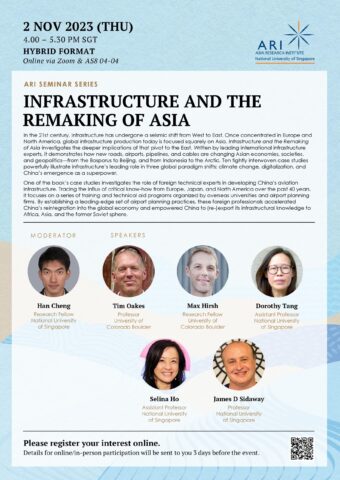
In the 21st century, infrastructure has undergone a seismic shift from West to East. Once concentrated in Europe and North America, global infrastructure production today is focused squarely on Asia. This hybrid seminar will introduce the open access book Infrastructure and the Remaking of Asia (University of Hawai’i Press 2023) which investigates the deeper implications of that pivot to the East. Written by leading international infrastructure experts, it demonstrates how new roads, airports, pipelines, and cables are changing Asian economies, societies, and geopolitics—from the Bosporus to Beijing, and from Indonesia to the Arctic. Ten tightly interwoven case studies powerfully illustrate infrastructure’s leading role in three global paradigm shifts: climate change, digitalization, and China’s emergence as a superpower. This event is part of the DIJ’s research partnership on Asian Infrastructures with the Asia Research Institute (ARI) at the National University of Singapore. Details and registration here
Workshop and public symposium on ‘Mediated Social Touch’
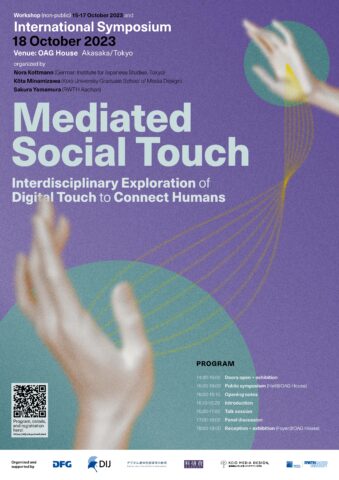 What is the future role of mediated social touch for social inclusion and societal participation in the context of the increasing digitalisation and diversification of Japanese and German societies? The workshop and symposium Mediated Social Touch. Interdisciplinary Explorations of Digital Touch to Connect Humans will bring together experts and practitioners from social sciences, neuroscience, haptics and computer science/AI to gain a comprehensive and multi-perspective understanding of mediated social touch and its potential for connecting humans in a digitalized world. The public symposium on 18 October at the OAG Hall in Tokyo is preceded by a three-day internal workshop. The project is funded by the German Research Foundation (DFG) and the Japanese Society for the Promotion of Science (JSPS). Details and registration here
What is the future role of mediated social touch for social inclusion and societal participation in the context of the increasing digitalisation and diversification of Japanese and German societies? The workshop and symposium Mediated Social Touch. Interdisciplinary Explorations of Digital Touch to Connect Humans will bring together experts and practitioners from social sciences, neuroscience, haptics and computer science/AI to gain a comprehensive and multi-perspective understanding of mediated social touch and its potential for connecting humans in a digitalized world. The public symposium on 18 October at the OAG Hall in Tokyo is preceded by a three-day internal workshop. The project is funded by the German Research Foundation (DFG) and the Japanese Society for the Promotion of Science (JSPS). Details and registration here
Hybrid DIJ Forum on Germany’s New Security Policy and Japan’s Take
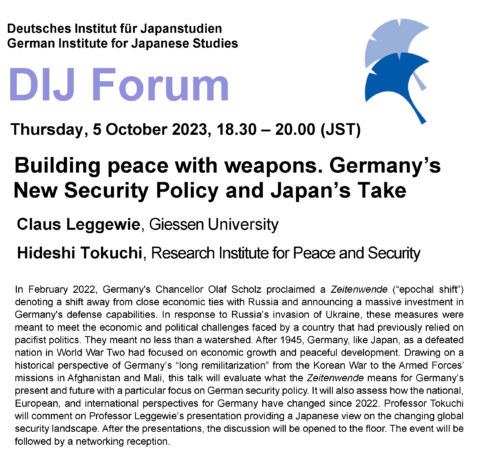
In February 2022, Germany’s Chancellor Olaf Scholz proclaimed a Zeitenwende (“epochal shift”) denoting a shift away from close economic ties with Russia and announcing a massive investment in Germany’s defense capabilities. These measures were meant to meet the economic and political challenges faced by a country that had previously relied on pacifist politics. Drawing on a historical perspective of Germany’s “long remilitarization” from the Korean War to the Armed Forces’ missions in Afghanistan and Mali, this talk will evaluate what the Zeitenwende means for Germany’s present and future with a particular focus on security policy. Professor Tokuchi will comment on Professor Leggewie’s presentation providing a Japanese view on the changing global security landscape. After the presentations, the discussion will be opened to the floor. The event will be followed by a networking reception. Details and registration here
Claus Leggewie, Giessen University
Hideshi Tokuchi, Research Institute for Peace and Security
Hybrid DIJ Study Group session on Spatial Dynamics in Japanese Poetry
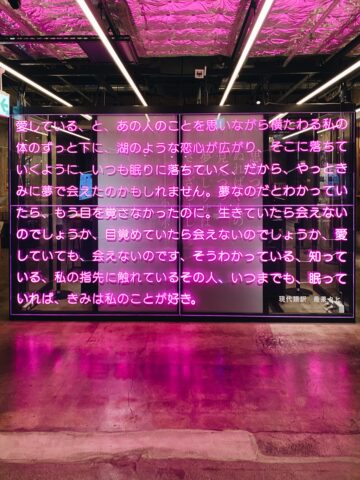
The COVID-19 pandemic has had a profound impact on our understanding of space. However, the world of reading, an activity traditionally seen as a purely cognitive act that allows readers to leave their physical bodies behind, appeared to remain relatively unaffected by these spatial constraints. This interdisciplinary presentation will closely examine poetic works like Saihate Tahi’s site-specific installation Shi no kasoku / shi no teishi (2020), Fuzuki Yumi’s sound installation Koe no genba (2021), and the online exhibition Kakuri-shiki nōkōsesshoku-shitsu (2020) by Mizusawa Nao and media artist Fuse Rintarō to explore space, proximity, and the act of reading within the context of poetry installations. The presentation will suggest that their works create poetic spaces that serve as a poignant reminder of the readers‘ own physicality. As a result, readers become more aware to the spaces that surround them and the far-reaching effects of COVID-19 on these settings. Details and registration here
Sarah Pützer, University of Oxford/DIJ Tokyo
Celia Spoden to discuss avatar robots in schools in Germany
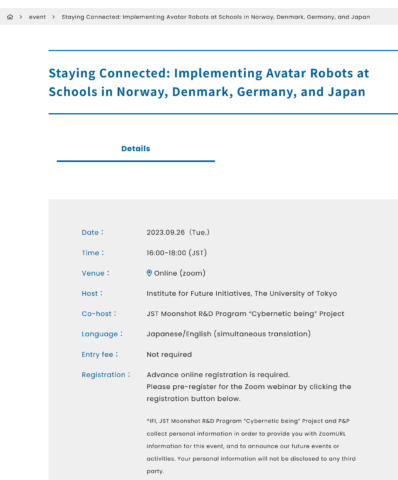
Avatar robots designed for children unable to attend school due to injury, illness, or disability have been increasingly adopted in Europe and Japan in recent years. The online event Staying Connected: Implementing Avatar Robots at Schools in Norway, Denmark, Germany, and Japan will show cases of avatar robots being introduced into educational environments in European countries and Japan, accompanied by discussions about their challenges and potential opportunities. It features presentations by Arisa Ema (University of Tokyo), Sofie Sejer Skoubo (Aarhus University), Marit Haldar, Maja Nordtug (both Oslo Metropolitan University), and DIJ’s Celia Spoden. The event is hosted by the University of Tokyo’s Institute for Future Initiatives (IFI) and takes place on Tuesday, 26 September 2023. Details and registration here
DIJ Newsletter Summer 2023
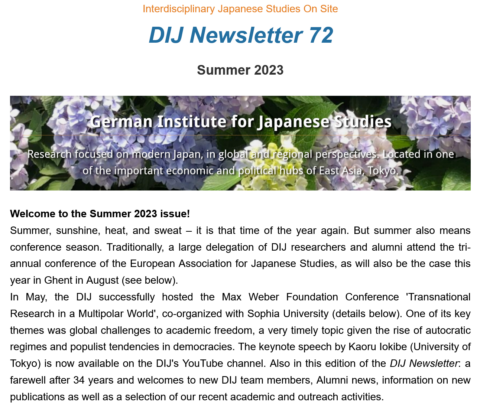
The summer issue of our DIJ Newsletter provides up-to-date insights into our research and publication activities, looks back to recent DIJ events, introduces new researchers, and gives updates on our outreach as well as on DIJ alumni activities. We hope you will enjoy exploring this new edition of the DIJ Newsletter. If you haven’t done so yet, you can subscribe to receive our Newsletters directly to your inbox. The full issues and subscription form are available here.
New book publication ‘Literature after Fukushima’ co-edited by Barbara Geilhorn
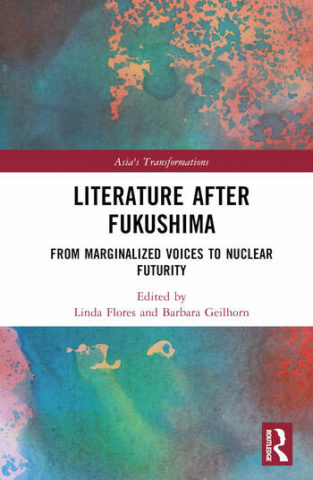
The new publication Literature After Fukushima. From Marginalized Voices to Nuclear Futurity (Routledge 2023), co-edited by Linda Flores and DIJ’s Barbara Geilhorn, examines how aesthetic representation contributes to a critical understanding of the 3.11 triple disaster – the Great East Japan earthquake, tsunami, and meltdowns at the Fukushima Daiichi Nuclear Power Plant in 2011. Based on key works from the 3.11 literature, the book explores how the disaster reframed discourses in trauma studies, eco-criticism, regional identity, food safety, civil society, and beyond. Literature after Fukushima is the first English-language book to provide an in-depth analysis of a wide range of representative literature on post-3.11 and its social ramifications. The ten contributors include Barbara Geilhorn (“Between Trauma Processing, Emotional Healing, and Nuclear Criticism— Documentary Theater Responding to the Fukushima Disaster”) and DIJ alumna Kristina Iwata-Weickgenannt (“Voice and Voicelessness: Reading Vernaculars in Post-3.11 Literature”). The book is an outcome of Barbara’s research project Arts and Literature after Fukushima. An interview with Barbara on this new publication can be found here (in German)
New journal article introduces research on relation between political activism and well-being
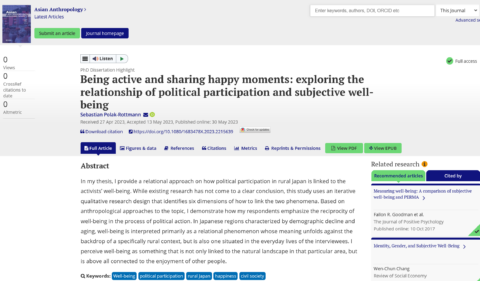
How is political participation in rural Japan linked to the activists’ well-being? In “Being active and sharing happy moments: exploring the relationship of political participation and subjective well-being” (Asian Anthropology, online first) DIJ political scientist Sebastian Polak-Rottmann provides insights into his doctoral dissertation, a qualitative study of the relationship between subjective well-being and political participation in Japan’s Aso region. His study uses an iterative qualitative research design that identifies six dimensions of how to link the two phenomena. In Japanese regions characterized by demographic decline and aging, well-being is interpreted primarily as a relational phenomenon whose meaning unfolds against the backdrop of a specifically rural context. However, his research shows that it is also situated in the everyday lives of the interviewees and connected to the enjoyment of other people. Sebastian’s doctoral dissertation is available full-text in open access (in German) here








 Open Access
Open Access
